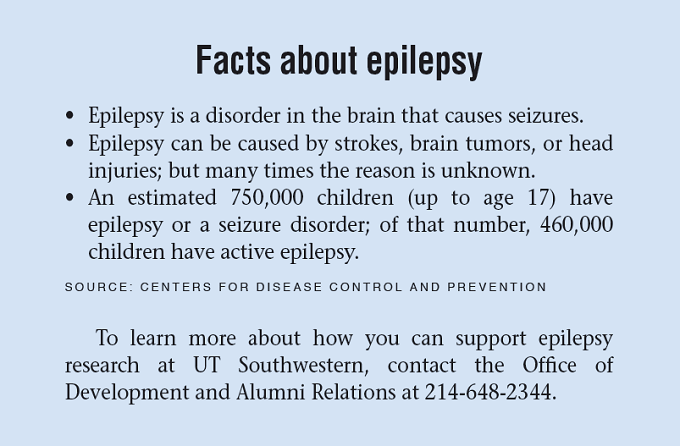Pediatric Epilepsy Research Foundation grants $1 million to UT Southwestern

Ragen S. and Dr. Roy D. Elterman
By Sharon Reynolds
The Pediatric Epilepsy Research Foundation (PERF) recently awarded a $1 million endowment to UT Southwestern Medical Center to establish the Roy D. and Ragen S. Elterman Distinguished Chair in Pediatric Epilepsy. This endowment supports clinical, research, and teaching activities of a mid-career physician-scientist in pediatric epilepsy. The Foundation focuses on developing child neurologists as teachers, researchers, and scholars who will act as role models to develop interest in child neurology among medical school students, residents, and fellows.
Dr. Elterman’s work played a fundamental role in the story of the Pediatric Epilepsy Research Foundation, which began with a hope to lessen the burden of pediatric neurologic disease on children and their families.
In the early 1990s, Dr. Roy D. Elterman, a Dallas pediatric neurologist, joined forces with Dr. W. Donald Shields, a pediatric neurologist in Los Angeles, to study use of the drug vigabatrin to treat infantile spasms, a rare and catastrophic type of childhood epilepsy. At the time, the drug had been approved in Europe and was being developed by Hoechst Marion Roussel Pharmaceuticals to treat adult epilepsy in the United States. FDA approval of vigabatrin was not expected for three to four years, so the FDA permitted them to conduct an independent efficacy study to prove the drug’s effectiveness in children. As an independent study, they would own the study data.
Dr. Elterman said FDA officials told him “someday, somebody will want to use this data to get the drug approved for children with infantile spasms.”
In 2000, Aventis Pharmaceuticals owned vigabatrin, but decided not to seek approval for the drug in the U.S., so the FDA asked Drs. Elterman and Shields to shut down the study. About two years later, a startup company, Ovation Pharmaceuticals, approached them with a plan to purchase vigabatrin from Aventis and market it for infantile spasms and refractory complex partial seizures in adults. To get FDA approval, Ovation needed their study data and presented Drs. Elterman and Shields with a unique opportunity.
“Ovation told us that in return for our data and once the drug was approved, they would provide a royalty stream to support a not-for-profit organization to fund research in pediatric neurology, including pediatric epilepsy,” said Dr. Elterman. “We formed the Pediatric Epilepsy Research Foundation as a not-for-profit foundation in 2004. Vigabatrin was approved by the FDA in August 2009. PERF received the first royalty payment in April 2010.”
Since 2010, PERF has used royalties from vigabatrin sales in part to fund grants to pediatric neurologists in the U.S. and Canada. These funds aim to improve treatment options for children with epilepsy and other neurologic conditions and support meritorious clinical and basic science research in these areas. Royalty income has also been used to create endowments to fund medical school scholarships and departmental chair positions, hoping those current and future physicians selected would encourage recruitment and education of medical students and early-career physicians in child neurology.

Dr. Berge Minassian
Dr. Berge Minassian, Chief of the Division of Child Neurology, is confident that the PERF award will lead to improvements in the diagnosis, management, and care of pediatric epilepsy patients. His wish is that one day, every child with epilepsy receives a proper diagnosis and is placed on a road to therapy.
“Epilepsy is a debilitating disease, and people don’t quite appreciate the problem,” said Dr. Minassian, who also leads the Neurosciences Center at Children’s Health Dallas and serves on the faculty of the Children’s Health Epilepsy Center. “A person with epilepsy is normal most of the time, so the disease is their hidden secret. We’re unaware of the disease because they look normal to us. The problem is a patient could seize at any time – at job interviews or while at work, going out with friends, or driving a car. Epilepsy affects their lives in negative ways that lead to depression and related issues.”
Having spent much of his 20-year research career seeking the underlying genetic causes of epilepsy, Dr. Minassian came to UT Southwestern to develop a gene therapy program. His presence will enhance efforts already underway at UT Southwestern to apply a gene-editing technique to precisely remove mutations in patient DNA and replace them with normal copies of the gene to fight, prevent, or cure disease. It is expected that gene-editing technology will lead to promising new therapies and bring hope to children with not only epilepsy, but other diseases as well.
“Understanding epilepsy will be a key to better understanding the brain and its related diseases,” Dr. Minassian said.
“This very generous gift from the Pediatric Epilepsy Research Foundation nurtures the scientific discoveries that will drive tomorrow’s medicine,” said Dr. Daniel K. Podolsky, President of UT Southwestern. “This endowment holds the potential to change the future for children with epilepsy and other brain diseases and improve their chances to live healthy and productive lives. All of us at UT Southwestern are grateful for PERF’s endorsement of our efforts through this meaningful gift.”
Dr. Elterman retired from his medical practice in 2011 and continues to serve as President of PERF, a role he has held since the Foundation’s inception. He and the board of directors are eager to help drive PERF’s substantial impact on the field of pediatric neurology and have awarded more than 30 grants and endowments totaling over $12 million. They believe there is much work to be done in pediatric neurology and pediatric epilepsy.
“PERF is making a million-dollar bet that the Division of Child Neurology at UT Southwestern will make substantial contributions to the field of pediatric epilepsy, and we want to see that happen,” Dr. Elterman said.
Dr. Minassian holds the Jimmy Elizabeth Westcott Distinguished Chair in Pediatric Neurology.
Dr. Podolsky holds the Philip O’Bryan Montgomery, Jr., M.D. Distinguished Presidential Chair in Academic Administration and the Doris and Bryan Wildenthal Distinguished Chair in Medical Science.
